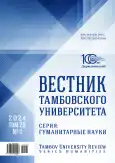Features of cultural work and ideological education of disabled people of the Great Patriotic War in 1945–1955 (based on materials from the Tambov Psychiatric Hospital)
- Authors: Shcherbinin P.P.1, Dyachkov V.L.1
-
Affiliations:
- Derzhavin Tambov State University
- Issue: Vol 29, No 1 (2024)
- Pages: 213-223
- Section: NATIONAL HISTORY
- URL: https://journal-vniispk.ru/1810-0201/article/view/297958
- DOI: https://doi.org/10.20310/1810-0201-2024-29-1-213-223
- ID: 297958
Cite item
Full Text
Abstract
Importance. The study of certain aspects of cultural work among disabled people of the Great Patriotic War who are being treated in psychiatric hospitals allows not only to clarify the features of the treatment process in medical organizations, but also to carry out a systematic detail of the socialization and rehabilitation of military veterans in the 40–50s of the twentieth century.Materials and Methods. The methodological features of the study of the stated problems are based on the author’s concept of involving the works of contemporaries, primarily specialists in the field of psychiatry, practitioners of the Tambov region, as well as the actual case histories and anamnesis of mental illness. Materials from state and party archives of the Tambov region and memoirs of contemporaries were used, many of which were introduced into scientific circulation for the first time.Results and Discussion. In fact, patients in psychiatric hospitals, to one degree or another, were involved in mass cultural events, ideologically verified political and cultural activities, which reflected the mentality of not only the party elite and nomenklatura, but also completely coexisted in the perception and understanding of the overwhelming majority of the population of the Soviet Union. The results of studying the problem made it possible to assess these processes, viewed through the prism of the development of regional healthcare, to identify not only the vectors and trends in the formation of Soviet psychiatry in the first post-war decade, but also to clarify the features of the relationship between government and society, the individual and the state, individual consciousness and the collective Soviet (“communist”) worldview.Conclusion. The results of the study allow us to draw a very obvious conclusion that cultural work, as well as political education in general, was not only an integral part of the ideological concept of the era of socialism, which lowered the entire structure of Soviet society, but also an important component of the treatment and preventive work of medical institutions of various profiles. These medical and social work activities were carried out very successfully in the Tambov region. However, in general, it should be noted that the lack of trained personnel and resources, including logistics, musical instruments, etc., often contributed to the formation of a superficial approach in organizing cultural work in psychiatric clinics. It is important to note that these shortcomings are fully preserved in the modern healthcare system in the Russian Federation. In fact, the traditions of budgetary residual financing of medical institutions are stable in the worldview of officials from different historical eras. But it is still worth noting that the general messages of ideological education consistently covered the entire population of the country, including patients in psychiatric hospitals. For these war veterans, political information, reading newspapers, and watching movies were quite common, which inevitably helped their rapid socialization, inclusion in normal communication, and ensured stable remissions during mental disorders.
About the authors
P. P. Shcherbinin
Derzhavin Tambov State University
Email: shcherbinin2010@gmail.com
ORCID iD: 0000-0001-7886-7833
Dr. habil. (History), Professor, Head of UNESCO on Human Rights and Democracy Department
33 Internatsionalnaya St., Tambov, 392000, Russian FederationV. L. Dyachkov
Derzhavin Tambov State University
Author for correspondence.
Email: mayormp@mail.ru
ORCID iD: 0000-0003-3365-9111
PhD (History), Associate Professor
33 Internatsionalnaya St., Tambov, 392000, Russian FederationReferences
- Zinich M.S. (2019). Everyday life of the people during the Great Patriotic War. Moscow, The Institute of Rus-sian History of the Russian Academy of Sciences Publ., 349 p. (In Russ.) https://elibrary.ru/uallub
- Zubkova E.Yu. (2000). Poslevoennoe sovetskoe obshchestvo: politika i povsednevnost’, 1945–1953 [Post-War Soviet Society: Politics and Everyday Life, 1945–1953]. Moscow, The Institute of Russian History of the Rus-sian Academy of Sciences Publ., Political Encyclopedia Publ., 230 p. (In Russ.)
- Chudinovskikh A.G., Shamrei V.K. (2018). Voennaya psikhiatriya v gody Velikoi Otechestvennoi voiny [Mili-tary Psychiatry during the Great Patriotic War]. St. Petersburg, Military medical academy of S.M. Kirov Publ., 130 p. (In Russ.)
- Shcherbinin P.P. (2022). Peculiarities of pension coverage for disabled war veteran and their employment in Tambov Region in 40s and 50s of the 20th century. Vestnik Tambovskogo universiteta. Seriya: Gumanitarnye nauki = Tambov University Review: Series Humanities, vol. 27, no. 5, pp. 1322-1331. (In Russ.) https://doi.org/10.20310/1810-0201-2022-27-5-1322-1331, https://elibrary.ru/dyefmp
- Shcherbinin P.P. (2022). Mobilizations during the wars of Russia in the first half of the 20th century and mental disorders. Vestnik Tambovskogo universiteta. Seriya: Gumanitarnye nauki = Tambov University Review: Series Humanities, vol. 27, no. 6, pp. 1412-1424. (In Russ.) https://doi.org/10.20310/1810-0201-2022-27-6-1412-1424, https://elibrary.ru/djmzer
- Gazha A.K., Shcherbinin P.P. (2021). Tambovskaya psikhiatriya v voennye gody (1941–1945) [Tambov psy-chiatry during the war years (1941–1945)]. Sbornik statey uchastnikov Mezhdunarodnoi nauchnoi konferentsii «Osobennosti demograficheskogo, mediko-sotsial’nogo, ehtnokonfessional’nogo razvitiya rossiiskoi provintsii v XVIII–XXI v.» [Collection of Articles by Participants of the International Scientific Conference “Features of Demographic, Medical, Social, and Ethno-Confessional Development of the Russian Province in the 18–21 Centuries”]. Tambov, IE Chesnokova A.V. Publ., pp. 65-70. (In Russ.)
- Shephard B. (2001). A War of Nerves: Soldiers and Psychiatrists in the Twentieth Century. Cambridge, Harvard University Press, 487 p.
- Wanke P. (2005). Russian/Soviet military psychiatry, 1904–1945. London, New York, Frank Cass, 145 p.
- Jones F.D., Sparacino L.R., Wilcox V.L. et al. (eds.). (1995). War Psychiatry. Falls Church, Office of the Surgeon General of United States of America Publ., 508 p.
- Gazha A.K., Nizkin S.I., Rayu N.A., Baranov A.V. (2007). Istoriya sozdaniya i razvitiya Tambovskoi psikhiatri-cheskoi bol’nitsy [The history of the creation and development of the Tambov Psychiatric Hospital]. Sbornik statei «Vydayushchiesya psikhiatry Rossii (istoriya i sovremennost’)» [Collection of Articles “Outstanding Psy-chiatrists of Russia (History and Modernity)”]. Moscow, Gosudarstvennyi nauchnyi tsentr sotsial’noi i sudebnoi psikhiatrii im. V.P. Serbskogo Publ., pp. 32-41.
Supplementary files








